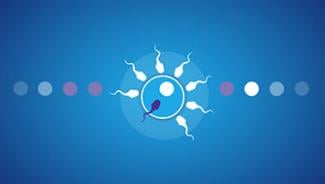What is a preconception appointment?

Sometimes making a preconception appointment is the first milestone people who are trying to conceive (TTC) get nervous about. You may start thinking, Am I really ready? I mean, I don’t even know what my doctor calls this appointment or even what it is! Don’t worry — we’ve got you covered. When making the appointment, you can simply say, “I’m thinking about having a baby and would like to make an appointment.” For everything else? Read on.
In this article
- What is a preconception appointment?
- What happens during a preconception appointment?
- Does everyone need to schedule a preconception appointment?
- When should you schedule a preconception appointment?
- Who do you schedule a preconception appointment with?
- Prepregnancy checklist: How do you prepare for your preconception appointment?
What is a preconception appointment?
According to the American College of Obstetricians and Gynecologists, a preconception appointment is “the first step in planning a healthy pregnancy.”1
In part, this appointment typically focuses on lifestyle and medical concerns. According to the March of Dimes, your doctor “looks for health conditions that may affect your pregnancy and the health of the baby.”2
Your doctor may also look for medical conditions that could affect your fertility.2 You and your doctor may also spend time talking about your medications, vaccinations, past pregnancies and the medical and family histories of both you and your partner.1
You should also have a chance to ask questions to help you prepare for pregnancy. (More on that below!)
Your healthcare provider or ob-gyn may call this appointment something else, such as a pregnancy care checkup1 or preconception counseling.3 It doesn’t matter what your healthcare provider officially calls it, though — just let them know you’re thinking about having a baby and would like to be seen.
What happens during a preconception appointment?
What happens during your preconception appointment is in part based on your personal health history, how long it’s been since you’ve last seen a healthcare provider and more. It may include a physical exam involving your heart, lungs, breasts, thyroid, abdomen, blood pressure and weight.3 Your healthcare provider may also perform a pelvic exam.2 Lab tests may be performed and could include a complete blood count (CBC), Pap smear, diabetes screening, and/or testing for rubella, hepatitis, thyroid issues and/or HIV.3
Does everyone need to schedule a preconception appointment?
It’s beneficial to have a preconception appointment because it gives you the chance to discuss your plans for TTC and your health with your healthcare provider. If certain health conditions run in your family, a preconception appointment is the perfect time to bring these up and determine any necessary follow-ups.
If you’ve been pregnant before and had any issues during that pregnancy, you may already know it’s important to connect with your healthcare provider before you try again.2 On the other hand, if you’ve just found out you’re pregnant, then it’s important to connect with your healthcare provider to discuss your ongoing care.
A preconception appointment is beneficial if your baby was premature or had a birth defect, or if you had a miscarriage or a stillbirth.2 Also, if certain health conditions run in the family, you may be referred to see a genetic counselor.2 However, if you’re already pregnant and you haven’t had a preconception appointment, don’t worry! Just schedule an appointment with your healthcare provider as soon as you can.
When should you schedule a preconception appointment?
You should schedule a preconception appointment at least three months before TTC,3 though scheduling it up to a year before you plan to get pregnant is perfectly fine.2 That said, if you’ve just found out you are pregnant, reach out to your healthcare provider right away.
Who do you schedule a preconception appointment with?
Try to schedule your preconception appointment with the healthcare provider you’d like to see throughout your pregnancy and the birth of your baby.2 According to the March of Dimes, this may include an obstetrician, family practice doctor, maternal-fetal medicine specialist, nurse practitioner or midwife.2 The March of Dimes provides a list of linked resources for how to find each of these providers in your area
Prepregnancy checklist: How do you prepare for your preconception appointment?
Here we offer several generic lists detailing what to bring and what to ask. Feel free to personalize these lists and make them your own!
What and who to bring to the appointment
- Your partner, family member or friend: While it can be helpful to have another set of ears and someone to ask a follow-up question you may not have considered, you also may be more comfortable attending this appointment alone and that’s OK, too!
- Your and your partner’s personal medical histories: Account for surgeries, hospitalizations, transfusions, preexisting medical conditions and allergies.3
- Your personal ob-gyn history: Keep in mind past pregnancies if applicable, menstrual history, contraceptives you may use, sexually transmitted infections (STIs), uterine abnormalities, abnormal Pap test results and vaginal infections.3
- List of current medications3
- Your and your partner’s family medical histories: Consider high blood pressure, diabetes, mental disorders, blindness, deafness, birth defects, multiples and conditions such as sickle cell disease.3
General prepregnancy questions to ask your healthcare provider
- I’m still on birth control. What is the best way to stop?
- When should I start taking a prenatal vitamin ? (FYI: Now!1)
- Can my health condition(s) affect a pregnancy?
- I had or have an STI. Will that affect fertility or a pregnancy?
- Can any of the health conditions that run in my family affect a pregnancy?
- Are all the medicines, vitamins and supplements I take OK while TTC? What about when I’m pregnant?
- Am I up to date on all my vaccinations?
- I use these chemicals or cleaning products a lot at work and home. Are they safe while TTC or pregnant?
What to ask about diet and lifestyle changes
- When thinking about a healthy prepregnancy diet, are there certain foods I should be eating more of while TTC and when I’m pregnant? Are there certain foods I should avoid?
- Am I able to exercise while TTC or pregnant? If I don’t exercise now, can I or should I start?
- Is it recommended I lose weight or gain weight?
- Do I have to stop drinking alcohol while TTC? What about caffeine?
- How much folic acid should I take with my prenatal vitamin?
- I’ve heard iron is important during pregnancy. How can I make sure I’m getting enough?
- Is there a certain amount of water I should be drinking daily?
Genetic screenings and what to consider
Before we get into potential questions, here are a couple of points to keep in mind about genetic screening (aka carrier screening). It is your choice whether you have these tests done, and there is no “right” choice for everyone.4 So talk to your doctor about what’s best for you. Also, genetic screening is testing that determines whether you carry a gene that could cause a specific disorder.4 The screening can be done before or during pregnancy.4
Questions you may want to ask (if any of the below apply to you) include:
- I don’t know my family’s health history or my partner’s family health history. Do you recommend screening in this instance?
- Based on my family’s health history and/or my partner’s family’s health history, do you recommend genetic screening for fragile X syndrome, sickle cell disease, Tay-Sachs disease or other conditions or disorders?
- Do you recommend genetic screening for cystic fibrosis, hemoglobinopathies and spinal muscular atrophy? (Note that everyone is offered screening for these.4)
One of the best gifts you can give to you and your baby-to-be is a preconception appointment. But again, if you’re reading this and you’re already TTC (or pregnant!) and you haven’t had a preconception appointment, it’s OK. Just call your healthcare provider and ask for one. Bottom line? Early communication is key for ensuring your pregnancy goes smoothly and you and your baby are both healthy, both during pregnancy and after birth.
Related Articles
Sources
- The American College of Obstetricians and Gynecologists. Good health before pregnancy: prepregnancy care. Updated December 2021. Accessed May 29, 2023. https://www.acog.org/womens-health/faqs/good-health-before-pregnancy-prepregnancy-care
- March of Dimes. Your checkup before pregnancy. Updated September 2020. Accessed May 29, 2023. https://www.marchofdimes.org/find-support/topics/planning-baby/your-checkup-pregnancy
- Cleveland Clinic. Preconception counseling. Updated October 30, 2019. Accessed May 29, 2023. https://my.clevelandclinic.org/health/articles/4503-preconception-counseling
- The American College of Obstetricians and Gynecologists. Carrier screening. Updated July 2022. Accessed May 29, 2023. https://www.acog.org/womens-health/faqs/carrier-screening

Get pregnant naturally
Ovulation tests are accurate and simple to use.






